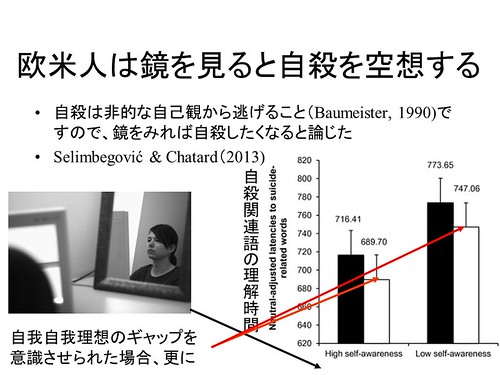Tuesday, May 10, 2016
Mirrors Make Westerners Want to Kill Themselves

According to the central theory of this blog, the "comforter" of the self in Japan and the West observes the self in a different media. In either case the comforter is based upon the mother. Before we become aware of our mirror image or our names we identify our subjectivity with that of our mother and later learn to see (Japanese) or hear (Westerners) ourselves as an object of her subjectivity or in her frame of reference. In Japanese, more matriarchal society the mother looks and the self is seen. In the West the mother is more passive, she listens. Self expression in the dominant medium of self expression is enjoyable and enhanced, and self expression in the non dominant medium is in each case fraught. Japanese enjoy taking pictures of themselves, posing, and "making (visual corporeal) things". Westerners love expressing themselves, shooting their mouth off, and (as I am doing now) making up theories.
本部論の主たる理論によれば、日本や欧米における自己の慰安者は異なる媒体において自己を傍観している。いずれの場合でも慰安者は母に由来する。自分を物語り、鏡の中で確認できる前に自らの主観を母と同感同一視し、後に母の主観・母の間のなかで自分らを見て(日本)、あるいは聞く(欧米)。より母性原理の強い日本においては母は観る、自己は観られる。欧米での母はより受動的で聞くものとされる(Freud)。主たる優位にある媒体における自己表現は快楽的ですが、それぞれの文化の劣位にある媒体における自己表現は居心地悪い。日本人は自撮りやポーズをとることが好きで、(視覚的な)物づくりを得意とする。欧米人は言語的自己表現や偉そうに話すことも、理論を作ることがすきです。
Japanese have a problem with linguistic self expression and Westerners have a problem with mirrors. Baumeister (1990) theorised that mirrors would increase the desire to escape from self in the most drastic way: suicide. Selimbegović & Chatard(2013) demonstrated this greater tendency towards suicide by testing the amount of time before subjects were able to recognise suicide related words (suicide, rope, wrist, hang, and attempt from nonsense words) in front of a mirror and in a control condition. It was found that subjects became quicker at recognising these words in front of the mirror and that this effect increased when the subjects were encouraged to think about how far they were from their own ideals.
一方、日本人は言語的自己表現が億劫で、欧米人は鏡が嫌い。Baumeister(1990)は鏡を見る欧米人は、「自己から逃げる」最も極端な手法である自殺に走らせると論じた。Selimbegović & Chatard(2013)は、自殺関連語(自殺・紐・手首・[首]吊り・未遂)をナンセンス語から見分けるまでの時間欧米の被験者において鏡の前で早くなるということで、自殺願望への傾向向上を示した。自我と自我理想のギャップを石示唆せられた被験者において鏡の効果がさらにつよくなりました。
In Japan mirrors are used on train platforms to prevent suicide. In the West telephones are used in same way but, as Butler (Butler, Lee, & Gross, 2009) demonstrates, linguistic expression tends to make Japanese MORE stressed.
日本では駅のホームでは鏡は自殺予防に一約を担っていますが、アメリカの自殺名所では電話が設置されます。Butler (Butler, Lee, & Gross, 2009) が示すように、日本が言語的表現をさせられると逆にストレスが増えます。
The recent use of telephones at Japanese suicide spots and Abe's initiative to make all 100 million Japanese verbalise their objectives and become "active" like Westerners (!) is from this perspective, a very bad idea. 日本の自殺名所での電話の設置や、日本人が自分らの行動を言語化し活躍する一億人総括という安倍首相の政策は、上述の立場から考えれば、名案だとは言えないと思われます。
www.flickr.com/photos/nihonbunka/11959516956
Bibliography
Baumeister, R. F. (1990). Suicide as escape from self. Psychological review, 97(1), 90.
Butler, E. A., Lee, T. L., & Gross, J. J. (2009). Does expressing your emotions raise or lower your blood pressure? The answer depends on cultural context. Journal of Cross-Cultural Psychology, 40(3), 510-517.
Selimbegović, L., & Chatard, A. (2013). The mirror effect: Self-awareness alone increases suicide thought accessibility. Consciousness and cognition, 22(3), 756-764.
Labels: japanese culture, nihonbunka, 日本文化
This blog represents the opinions of the author, Timothy Takemoto, and not the opinions of his employer.
